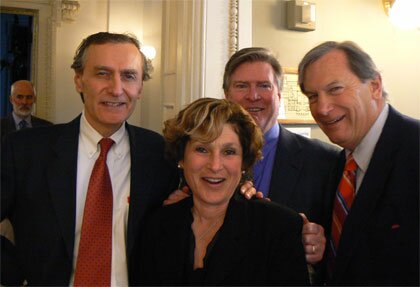Hinda On “Deep Democracy” and H863
The Legislature threaded too many needles to count this past session, one of the trickiest involving the omnibus housing bill, H863. Considering the number of interests it might have offended, the bill was eventually In the piece below, Hinda Miller offers her own birds-eye view of the complex — and existentially searching — process of bringing it in for a landing. — PB

Miller, with Illuzzi, Campbell, and Hartwell.
The Inside View:
Sometimes Miracles Do Happen
by Hinda Miller
Sometimes miracles do happen in the Vermont legislature. Sometimes a diverse group of stakeholders work together to create the art of the possible. Sometimes a legislator can stimulate a collaborative and productive process for the highest good.
This all happened in the creation and ultimate passage of the omnibus housing bill H863, an act relating to municipal planning, encouraging smart growth, purchasing of mobile homes, closure of mobile parks, landlord tenant relations and the state residential lead-based paint poisoning prevention program.
“Deep democracy” is described by Dr. Patricia Wilson, University of Texas, as an organizing principle based on the transformation of separation to interconnectedness, leading to sustainable change. It happens among self-help groups in rural India, in an organization of urban squatters in S. Africa and among environmentalists and developers in successful urban planning.
It starts with the practice of collective engagement, where one listens to the other, to see though the other’s frame and moves towards the visioning of “the whole that wants to emerge.”
The emergence of a healthy supply of affordable housing choices for all working Vermonters at all income levels has long been a challenge for our families, businesses, and the economy.
Affordable homes create the foundation of physical safety, mental stability and spiritual appreciation for healthy and prosperous communities.
Although the Governor had submitted a housing bill in 2004, there was a lack of collaboration and detail that made it difficult to pass with such seemingly opposite agendas: protecting the environment, streamlining state regulations, incorporating Smart Growth principles, and addressing affordability issues like density, cost of land, predictable permitting, lack of inventory and other costs surrounding home ownership.
Such stakeholder complexities rarely get resolved in the Statehouse alone. Much homework and study needs to happen in our communities to get concensus as to how to move forward. It takes leaders ready to play a critical role in nurturing the collective reflection that allow participants to break through old patterns and connect with others in collaborative action.
Such a process leader was Greg Brown, executive director of Chittenden County Regional Planning Commission, who, in the summer of 2007, convened advocates from landtrusts, environmental protection, business and homebuilders to provide an initial platform for discussion.
At the same time, I asked key legislators and the administration to sort out old accusations and blame-game editorials that prevented us from moving forward.
Last April, the House sent a controversial bill over to the Senate without majority support. We had to work fast. With support from the pro-tem Peter Shumlin, Senator Vince Illuzzi, Chair of Senate Economic Development Committee, and myself as Vice Chair, decided to give it our best effort.
Though exhausted and a little dubious, a re-energized group of stakeholders sat down to renegotiate basic ingredients for success.
Kevin Dorn and Molly Dugan from the administration participated as well as lobbyists representing diverse stakeholders: Dawn Francis, Lake Champlain Regional Chamber of Commerce; Adam Necrasen, spokesperson for various non-profit land trust organizations and Smart Growth Vermont; Tayt Brooks, Assoc. of Homebuilders and Remodelers; and Brian Shupe, Vermont Natural Resource Council.
Unlike Washington lobbyists who are perceived as untrustworthy agents of big business, here in Vermont they can and do operate differently.
Without staff at our disposal, legislators often depend on lobbyists to solve disputes, draw up rough copy, give input on draft legislation and make sure that their constituencies are brought along in the negotiating process.
At this point, Darby Bradley, the revered leader of the land trust movement, with the help of Andy Broderick, stepped up to encourage and endorse certain compromises.
In my six years in the Statehouse, I have never seen such intensity of daily meetings, negotiating, redrafting language, and checking back to see if their stakeholders would agree to changes.
This process of deepening and expanding the consciousness of all participants made us have a deeper appreciation of the whole rather than fighting for our part.

My job, which I relished, was to listen for what was not said and to ask those questions from a place of positive neutrality; to keep people on task while continually dancing around the circle, venturing out of safe corners and painfully giving up more than they thought they could the day before.
This group of hard working people was just one pod in the development of this omnibus bill. Others included Senator Jim Condos, guru of affordable housing in S. Burlington, and Senators Lyons and Cummings who guided the conference committee, chaired by Senator Illuzzi, on lead exposure and affordability issues.
Rental Housing laws were championed by Stuart Bennet and Nadine Scibeck, representing landlords and non-profit housing corporations, Richard Williams of Vermont State Housing Authority as well as Ted Wimpey, Erhard Mahnke of the Affordable Housing Coalition and Chris Rice.
Much progress was also made for mobile home parks. The residential lead paint prevention program was crafted with the help of Wendy Morgan, Attorney General’s office, and Angela Zaikowski who made it reasonable for renters and owners.
Paul Bruhn of Preservation Trust of Vermont worked for an increase in the successful downtown credit program. Treasurer Jeb Spaulding and Sarah Carpenter, exec. director of VT Housing Finance Agency, were directed to look at ways to reduce the cost of loans as well as closing costs.
I have not even mentioned the many witnesses and committee members that worked so hard in the House to contribute to our collective understanding of the issues. Rest assured this bill is just the start of a roadmap that will evolve as we study and resolve many other housing, development and environmental issues.
Having finally found a role that suits my vision of inclusion and interaction for the highest good devoid of political bickering, I also developed a better understanding and respect for the art of the deal.
The master of this process, Senator Illuzzi brought us down the home stretch by withholding some elements and trading priorities for practical as well political reasons.
I take the time to tell the tale, to celebrate the process and feel encouraged that sometimes miracles do happen in the Vermont Legislature.